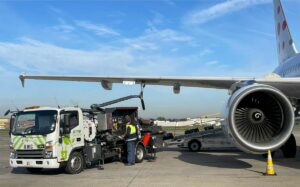Nov 29, 2022

Brussels Airport’s Stargate project, which has received funding from the European Green Deal, has now been running for 1 year. Brussels Airport is working with a consortium of 21 partners on some 30 specific projects to make aviation and airports more sustainable. The first year saw the start-up of the project, during which a considerable amount of preparatory work was undertaken but was also one in which the first applications on site became visible: electric ground handling equipment and electric hydrant fuel dispensers were tested and a first version of the Digital Twin of the four participating airports is now ready for use
The Stargate project of Brussels Airport as project leader, together with 21 partners including three European airports, airlines, mobility and knowledge institutions and local authorities, was selected in 2021 within the European Green Deal and was officially launched in November 2021. Stargate has the ambition to develop innovations and initiatives for an accelerated transition to a greener aviation and includes around thirty small and large projects, focused on three main areas: a further decarbonisation, improving the quality of the local environment and promoting a modal shift.
The first year of the project was a genuine start-up year, whereby considerable organisational and preparatory work was undertaken, including tender procedures, market surveys, and so on, but during which concrete steps were implemented for several sub-projects.
Electrification tested on site
In the area of decarbonisation, one area of focus within Stargate will be on testing electric ground handling equipment. During the past year, DHL has, as partner within the consortium, tested various types of electric ground handling equipment during their operations, including electric high loaders and electric tractors for handling cargo. After this extensive and positive test period, DHL will soon be making a first significant investment in the electrification of their ground handling equipment with the purchase of electric tractors, belt loaders and nose lifters for making their ground operations more sustainable.
In addition, Skytanking is currently performing a large-scale test at Brussels Airport with two 100% electric hydrant fuel dispensers. These made-to-measure vehicles of Turkish Fuel Services are of Belgian design and are being tested to gain the necessary insights into charging solutions and battery performance. The test will run until March 2023 and will help determine the ideal battery size for each truck and the optimum charging infrastructure. In the course of the years ahead, Skytanking wants to develop, test and use its own 100% electric hydrant fuel dispensers; this will go hand in hand with the implementation of the necessary infrastructural changes at the airport.
Read more: Brussels Airport becomes the majority shareholder of Jetpack
Digital innovation in practice
One of the promising projects within Stargate is the development of a 3D model for airports, that maps the energy streams and operational processes so that a calculation can be made of where improvements and adjustments are possible and necessary. A Digital Twin, as it were. The first version of the Digital Twin for the four partner airports – Brussels, Athens, Budapest and Toulouse – has now been developed in collaboration with Stargate partner Integrated Environmental Solutions Ltd. This Digital Twin contains all information about the energy use and the CO2 emissions of the various processes at the airports, so that Stargate solutions can be simulated in advance in order to study where things can be improved and adjusted. In this way, it is possible to map the impact of additional solar panel parks before actually installing them.
Athens International Airport and Budapest Airport, in collaboration with Air Cargo Belgium, are also currently working on the digitisation of their cargo operations modelled after the Digital Green Lane at Brussels Airport. This leads to a more automated and paperless process for cargo handling and a better use of the available capacity and to shorter waiting times for the trucks landside, which reduces the CO2 emissions of the airports.
Read more: Brussels Airport renewed as Belgian Olympic athletes partner
In the pipeline
The introduction of sustainable aviation fuels is also part of the Stargate project. The Sustainable Aviation Fuels (SAF) market is evolving very rapidly. In recent months, extensive study has been carried out into the most efficient way for the aviation industry in general, and airports and airlines in particular, to prepare for the use of SAF. An important change since the start of the Stargate project is the growing chance that, in the near future, the NATO pipeline to Brussels Airport will be available for the transport of sustainable fuels in addition to kerosene. This exceptionally sustainable means of transport for SAF will reduce the need for a large-scale blending plant; as a result, alternative actions are currently being considered, such as the small-scale mixing of biofuel with kerosene with high blend ratios.
Ancillary to this, Quatra, as Stargate partner for the supply of used deep-frying oil that can be processed in these sustainable fuels, has taken a brand-new OiloBox truck into use in the past year. This truck will be used to collect household deep-frying oil from collection points in the direct vicinity of the airport. To encourage people to participate in this Belgian circular story, a collaboration is also being started with Vandemoortele and a population survey and awareness raising campaign will follow, in cooperation with the University of Hasselt and the Province of Flemish Brabant.
In addition, Aèroport de Toulouse-Blagnac and Athens International Airport are collaborating with the University of Hasselt and aviation consultancy agency To70 to elaborate the possible actions for the introduction of SAF that have been studied and listed and adapt them to the local context in order to stimulate the use of sustainable aviation fuels at these airports too.
The partners in the Stargate consortium are Athens International Airport, Budapest Airport, Aèroport de Toulouse-Blagnac, Brussels Airlines, TUI, DHL Aviation, Engie Laborelec, Air Cargo Belgium, Skytanking, skeyes, To70, Lux Mobility, University of Hasselt, Erasmus Centre for Urban, Port and Transport Economics, IES R&D, Sopra Steria, Province of Flemish Brabant, Quatra, Flemish Institute for Technological Research (VITO), NMBS and the Flanders Institute for Logistics.
The post Brussels Airport Stargate project for greener aviation marks 1 year anniversary appeared first on AIR CARGO WEEK.
Go to Source
Author: Edward Hardy




